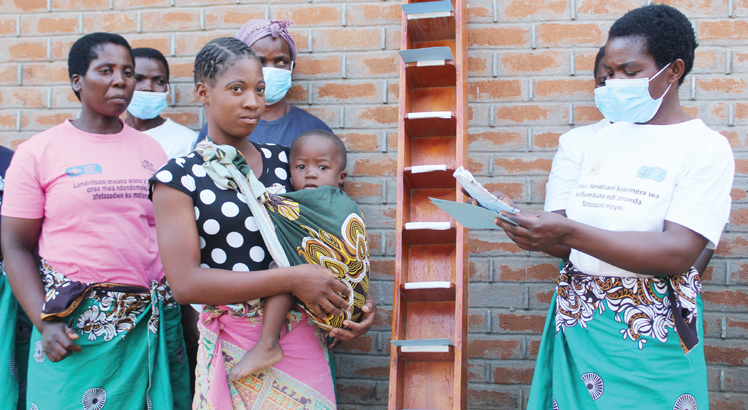Women take vaccines to tobacco heartland
In Kasungu, producing tobacco for the world market leaves some growers with little time to mind their children’s health.
This makes the rainy season tricky for women groups determined to get every baby fully immunised by its fifth birthday.
“Tobacco is the largest cash crop in our district and country, so we have to constantly remind farmers to get their children vaccinated,” says Elita Mdyetseni, chairperson of Zumani Mother Care Group in Kasungu West.
Since 2019, the group of 30 has been going door-to-door, reminding neighbours of the dates their children are due for vaccination and tracking defaulters.

They want to leave no one behind, saying the whole community is not safe until everyone is protected from vaccine-prevented infections. But the intense workload in tobacco estates overstretches the volunteers.
“Since tobacco makes many farmers forget their children’s well-being, we constantly persuade estate owners to release their workers so they can take children to vaccination sites. Many agree,” Mdyetseni states.
Now community health workers vaccinate more than twice the count before the negotiations got underway.
“During our under-five clinic held in the first week of every month, community health workers used to see about 70 children, but now vaccinate almost 180,” she explains.
Zimani Women Care Group is one the change agents trained by Malawi Health Equity Network (Mhen) with support from Gavi, the global vaccine alliance, in partnership with the national Expanded Programme Immunisation (EPI).
The volunteers are excited that vaccine-prevented diseases that used to haunt children, including diarrhoea, are declining.
In 2018, a study by University of Liverpool, Bloomberg School of Public Health and their partners in Malawi showed that rotavirus vaccination reduced infant diarrhea deaths by 34 percent among the country’s rural majority, where deaths of children remain prevalent.
“This is good news to us as care group members,” says Alineti Phiri.
Like her group, she does not get any pay, but happily helps “nurture a generation of safe, healthy and productive citizens”.
“Children are the future of our nation. They will make us proud if we safeguard them now,” Phiri states.
Villagers near Kasungu National Park used to walk over 15 kilometres to get to Linyangwa Health Centre. Now a health surveillance assistant (HSA)makes the draining trip to bring vaccines and other child-related health services to the underserved community.
“But there’s a problem,” says Fanny Chiphanthenga. “Most people used to shun the outreach clinic held in a leaky shack with grass walls and thatch. It’s muddy in the rainy season and dusty in the dry months.”
The women group persuaded chiefs to allocate land for a brick-and-mortar clinic.
The village heads requested every household to contribute K7 000 to the project so the rural population can get health services without hardship come rain or sunshine.
They dug a foundation following designs by the Ministry of Health, but constructed a smaller facility because 200 bags of cement were scarcely enough.
“The community couldn’t wait because most children weren’t being vaccinated in the poor setting,” says HSA Isaac Mdolo, from Linyangwa.
The community health worker is excited with the prospects of vaccinating children in a decent building where he can safely store vaccines that perish when exposed to high temperatures.
Records show Zimani plays home to 1497 children, with 254 aged below five and 67 babies born yearly.
“The dedicated women group has simplified our job. We are few and overwhelmed, but they help us mobilise people. Now we vaccinate 134 children a month, up from 69 before the group’s inception,” Mdolo explains.
The group takes stock of immunisation figures and tracks defaulters.
“When children skip a vaccine, care group members ask parents to take them to Linyangwa or Kapyera health centres for catch-up doses,” Mdolo states.
Essau Warren, from Kasungu EPI coordination office, is happy that 83 in every 100 children in the tobacco-producing district are fully inoculated.
“The care groups are helping overwhelmed health workers who cannot spread vaccination messages and track defaulters on their own,” he explains.
Area Development Committee leader Feliati Samson hails “the foot solders” at war with myths, misconceptions and other barriers to healthcare services children need.
“Previously, people here didn’t know the importance of immunisations, but now they know and demand quality services for their children. They also take part in creating an enabling environment, including communal efforts to construct a clinic,” she says.
Samson visualises fully vaccinated children growing healthy, spending more time in school to become productive workers unlikely to further burden the country’s health facilities and spending with preventable diseases.
“Healthy children give adults ample time for income generating activities instead of nursing the sick. That’s why we need to put children’s health first, not tobacco.”





